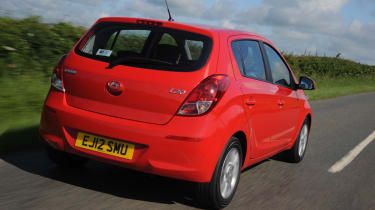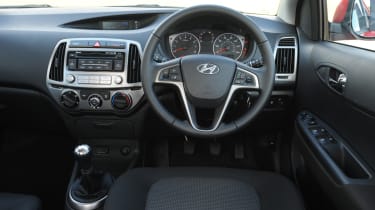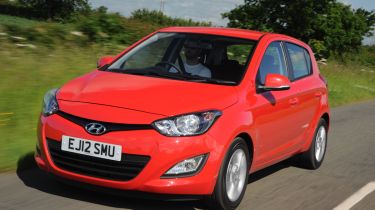Hyundai i20 review (2008-2014)
The Hyundai i20 is a value alternative to the Ford Fiesta, with lots of space and a comfortable ride

The Hyundai i20 is a great value alternative to established supermini rivals such as the Ford Fiesta, VW Polo and Peugeot 208. Available in both three and five-door guises, the i20 is very well equipped, cost effective to run and backed by an industry-leading five year warranty and breakdown recovery package.
Launched in 2008, the i20 was one of the first Hyundai models to be developed at the brand’s European technical centre in Russelsheim, Germany. Initially the car proved to be a big hit under the UK government’s scrappage scheme that was designed to boost new car sales, before a facelift in 2012 gave the car a more grown-up and desirable look.
The engine line-up is limited to a pair of petrols – a 1.2-litre manual and a 1.4-litre automatic – and a 1.4-litre CRDi diesel. All deliver decent performance, but the 1.4-litre petrol will leave the largest dent in your wallet courtesy of its high CO2 emissions of 140g/km and poor real world fuel economy.
• Best superminis on the market
There are also just three trim levels to choose from – Classic, Active and Style. Even so, all models are well equipped, featuring electric windows, a USB connection, remote central locking and air-conditioning.
Used - available now
On the road, the i20 can’t match the agile Ford Fiesta for handling or the hushed VW Polo for refinement, but it’s composed, capable and easy to drive. The major controls are light, while visibility is excellent.
Yet what the Hyundai lacks in driving thrills it makes up for with practicality. The interior is surprisingly roomy, the boot is big and there’s plenty of handy storage. It’s also cheap to buy, with prices starting at just a shade over £10,000.
Engines, performance and drive
The i20 can’t match the Ford Fiesta or Suzuki Swift for handling, but it does have its own strengths. Most notable is its refinement, especially at motorway speeds, where wind and road noise are well isolated from the cabin.
The steering is light enough for town use but it weights up inconsistently in corners and lacks feel, while the ride is a little firm. Even so, there’s decent grip and the i20 always feels safe and predictable in corners.
The limited engine line-up consists of two petrol engines and one diesel. The 84bhp 1.2-litre four-cylinder petrol is a little harsh and breathless when extended, but delivers decent performance and feels responsive enough at low speeds. It’s also mated to a reasonably slick and precise five-speed manual gearbox.

The 99bhp 1.4-litre petrol is more powerful and a little more refined, but it’s only available in combination with an old-fashioned four-speed automatic gearbox. As a result, it’s no quicker than the 1.2-litre yet costs a lot more to run.
The only diesel choice is the 89bhp 1.4CRDi Blue Drive unit that is available exclusively in Active five-door trim. It’s a surprisingly smooth powerplant that packs plenty of mid-range punch. It also promises to be cheap to run, thanks to low CO2 emissions of 96g/km and claimed fuel returns of 76.3mpg.
However, it attracts a price premium of around £2,000 over the identically equipped 1.2-litre petrol, so you’ll need to do a lot of miles for the fuel savings to pay off.
MPG, CO2 and Running Costs
As with most Hyundais in the range, the i20's low price tag is appealing. It costs around £1,000 less than an equivalent Fiesta and even undercuts the Suzuki Swift by a few hundred pounds. Even better, these attractive prices don’t come at the expense of standard kit, as all i20 models are very well-equipped.
In terms of ultra low running costs, the 89bhp 1.4-litre CRDi diesel is hard to beat. By using Hyundai’s Blue Drive eco-friendly kit that includes Intelligent Stop & Go stop-start system, aero tweaks and low rolling resistance tyres, the diesel emits just 96g/km and returns 76.3mpg. Yet there is a catch. It costs nearly £2,000 more than the 1.2-litre petrol, meaning you’ll have to well over 18,000 miles a year to offset the car’s price premium.
As a result, the 1.2-litre petrol will be best for most owners. It’s not as clean and efficient as the Ford Fiesta EcoBoost, a fuel return of 57.6mpg and 114g/km CO2 emissions mean it won’t cost the earth to run.
The least cost effective i20 is the 1.4-litre petrol, which is hobbled by its outdated four-speed automatic transmission. The efficiency-sapping gearbox is at the root of the model’s high C02 emissions of 140g/km and disappointing 47.1mpg claim at the pumps.
All Hyundai’s come with the firm’s Five Year Triple Care package, which includes a five-year unlimited mileage warranty, five years’ free roadside assistance and five years of vehicle health checks. There’s a range of fixed-price servicing deals, too, with a three year plan costing £349 and a five year package setting you back £649.
On top of this, insurance groups range from eight to 12, giving it an extremely low price for all owners. The one downside is that the resale price isn't great, but it's no worse than other cars in the same class.
Interior, design and technology
The Hyundai i20 isn’t the most stylish supermini on the market. Rivals like the Ford Fiesta, Peugeot 208 and curvy Suzuki Swift are far more distinctive, which leaves the i20 to blend into the background. A facelift in 2012 incorporated the sleeker looks of Hyundai’s ix20 MPV and i40 saloon, which helped give the i20 a more grown-up look.
The biggest styling changes were made at the front, with a hexagonal grille, detailed headlights and a new sculpted bonnet, all influenced by Hyundai’s new fluidic sculpture design language The reprofiled bumpers also increased the i20’s length by 55mm, giving it a more imposing stance.
The interior is well laid out, with a smart centre console and piano-black inserts around the stereo. But touches like the slim trip computer integrated into the top of the dashboard look dated, while some of the trim feels flimsy.
There are four specifications to choose from – Classic, Active and Style – and all come with plenty of kit and accessories. For instance, all models benefit from electric front windows, central locking, a USB music connection and air-con.
Active models add 15-inch alloy wheels, body-coloured door handles, front fog lights, all-around electric windows, Bluetooth connectivity and a leather-covered steering wheel and gear knob, while range-topping Style cars come fitted with 16-inch alloys, climate control, automatic headlamps and wipers, as well as LED daytime running lights and parking sensors. The only option available is a £495 metallic paint finish.
Practicality, comfort and boot space
At 3,995mm long, 1,710mm wide and 1,490mm tall, the i20 is one of the longest and widest superminis available, which means it’s not short on interior space. You also get a handy cooled glove compartment that is ideal for storing sandwiches and drinks, while plenty of convenient storage cubbies placed around the interior make it ideal for all iPod and other accessories.
Three adults will just about be able to sit on the back bench, plus there’s plenty of boot space, too. Both three and five-door versions boast 295-litres with seats in place, which is more than both the Ford Fiesta and Volkswagen Polo. With the rear seats folded this figure increases to a massive 1,060 litres.

However, there is one downside – folding the rear seats is no mean feat, and you’ll even need to remove the headrests if you want a completely flat load area.
It’s easy to get comfortable behind the wheel, though, as the driver’s seat adjusts for height, while the steering wheel can be repositioned for height and reach. All versions come with a space-saver spare wheel as standard.
Reliability and Safety
The Hyundai i20 was given a five-star Euro NCAP crash rating when it was tested back in 2009, with 88 per cent for adult occupant protection and a score of 86 per cent in the safety assist category. Electronic stability control is fitted as standard across the range, as is anti-lock brakes, Isofix child-seat fixings, active head restraints and a total of six airbags.
Go for the range-topping Style and you’ll also benefit from bright LED daytime running lights as well as automatic operation of the windscreen wipers. However, unlike the VW Polo and Ford Fiesta, there’s no option to add big car extras such as adaptive cruise control and forward collision alert.
The i20 didn’t feature in our 2014 Driver Power satisfaction survey, but Hyundai finished a disappointing 18th overall in the manufacturers’ ranking. Even so, the brand fell just outside the top ten for reliability, so owners can expect trouble-free service from the i20.
It has also never been the subject of a recall, and there have been no reports of any major problems or faults. And while the interior plastics look and feel a little cheap, they are hard wearing and should stand up to the rough and tumble of family life.
As with every Hyundai, the i20 is comes Hyundai’s excellent five-year unlimited mileage warranty and breakdown cover. Even better, the guarantee includes a free annual health check for the duration of the policy.











